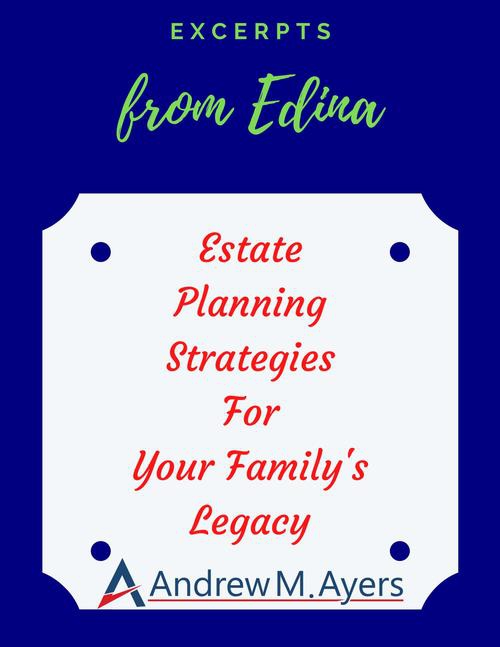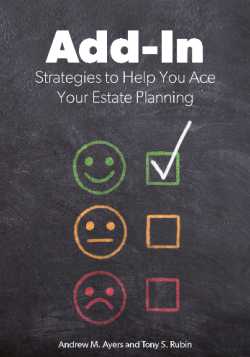 This weekend's New York Times had an interesting article by Sara Murphy about a decision that many people who do not have children or close relatives face when creating their estate plan: Who should I leave my estate to?
This weekend's New York Times had an interesting article by Sara Murphy about a decision that many people who do not have children or close relatives face when creating their estate plan: Who should I leave my estate to?
As the article points out, when you are married, or when you have children, designing an estate plan can be a relatively straightforward process. You have a natural and immediate set of family members who can inherit from you, and in the case of accounts with beneficiary designations, can often inherit from you on a tax-advantaged basis as well.
However, what if you don't have an immediate family? Creating an estate plan for your parents, who may be older than you and not likely to outlive you, doesn't always make sense. So in this situation, who can you leave your estate to? The article in the NY Times points to one solution, which is to leave your estate to your close friends. Another solution that my clients also like to consider is to leave part (or all) of their estate to charities or causes that they support.
Challenges to Leaving Your Estate to Your Friends
The article has a quote from a law professor who said people don't normally confront this estate plan challenge, but in my practice, this question is not all that uncommon. The professor raises concerns about people challenging the wills that leave assets to friends, however, in practice, working with an attorney allows you to prepare for that possible outcome and you can provide the appropriate language in your documents to dissuade contests to your estate plan. For clients who are choosing to leave portions of their estate to friends, they often have good reasons for doing so and their relatives tend to be not particularly close, and in some cases estranged, from them anyway.
Planning for Incapacity
Another concern raised by the professor is how a person without close family members can plan for their possible incapacity. The most common document you'll use for these circumstances is called a Power of Attorney, and they are often drafted for financial matters and for healthcare matters.
A financial power of attorney is designed for someone to make financial decisions for you. Normally, it has a list of "powers" that you are granting to someone and you have the choice of granting all of the powers or choosing only some powers. If you've purchased a house and weren't able (or didn't want to) attend the closing, you may have filled out a power of attorney granting someone else the power to sign on your behalf at the closing. Or if you work with a financial advisor, they may have a form they want you to fill out for their records that allows them to consult with someone else regarding your financial decisions if you are unable to do so.
The other type of power of attorney that you need to know about is a Healthcare Power of Attorney. Like a financial power of attorney, it also has a list of powers that you are granting to someone when it comes to your medical decisions. Unlike the financial power of attorney, it tends to be more "in-depth" and provides more guidance for your agents as to what you want to have done with your health decisions.
Your state likely has a basic healthcare directive of some type on its website, but this is an area where it's important to work with a professional so you know what you are signing and that you understand it. You are giving someone else immense power to make medical decisions and it's important that you are clear on what you do and do not want.
Choosing Your Personal Representative
In addition to planning for your possible incapacity, you also need to look at who will fulfill the role of personal representative (sometimes called an executor or administrator) of your estate. The role this person serves is to gather all of your assets, pay off liabilities, and distribute your estate according to the terms of your will. If you don't have a will, then someone will need to go to your local probate court and be appointed as the administrator of your estate and will likely have a long road ahead of them in dealing with the court and the assets of the estate.
Choosing a friend to fulfill this role is challenging because you are asking a lot of someone. They will have a significant amount of responsibility for your estate after you're gone, so it's usually a good idea to have talked to them about this in advance so they know it's coming and are willing to take on that role.
Friends and Estate Plans Aren't That Challenging
Despite the premise of the article, leaving your estate to friends is not actually that challenging. If you are trying to do it yourself, there are plenty of pitfalls and easy mistakes that you can make. However, if you work with an estate planning professional, with your financial advisor, with your accountant, you can craft an estate plan that leaves a legacy to your friends and others you care about. The article also does not generally explore the importance of using your estate plan to leave a charitable legacy as well, another common tactic that can leave behind your estate to non-family members.
It's a good reminder that you need to be intentional about how you craft your estate plan so that you are sure to leave behind the legacy that you desire.
Do You Need an Estate Plan?
If you don't already have an estate plan, or if you have one that needs to be updated, let's schedule a Legal Strategy Session online or by calling my Edina, Minnesota office at (612) 294-6982 or my New York City office at (646) 847-3560. My office will be happy to find a convenient time for us to have a phone call to review the best options and next steps for you to work with an estate planning attorney to get your estate plan prepared.




